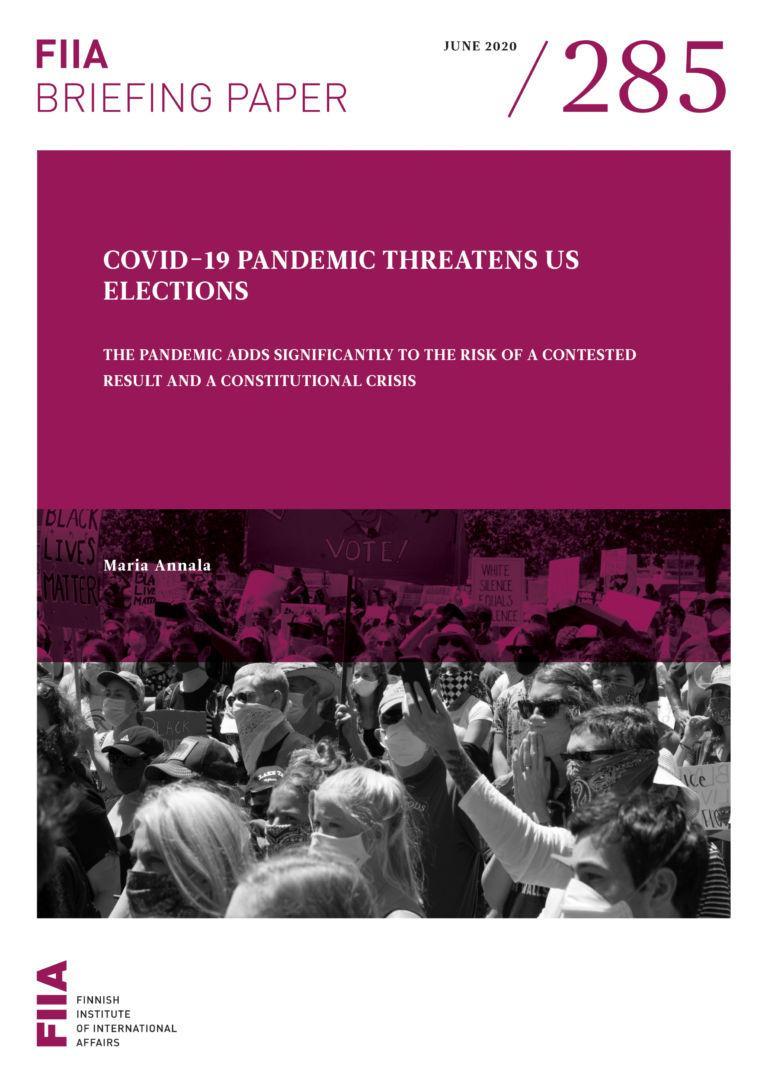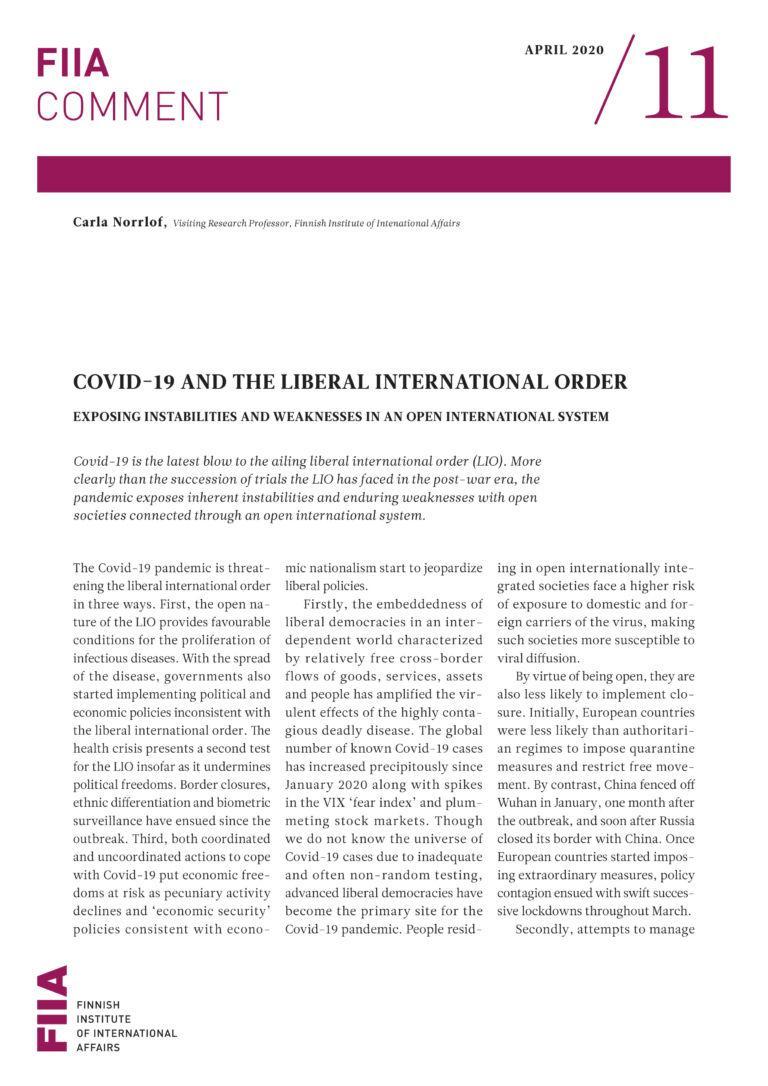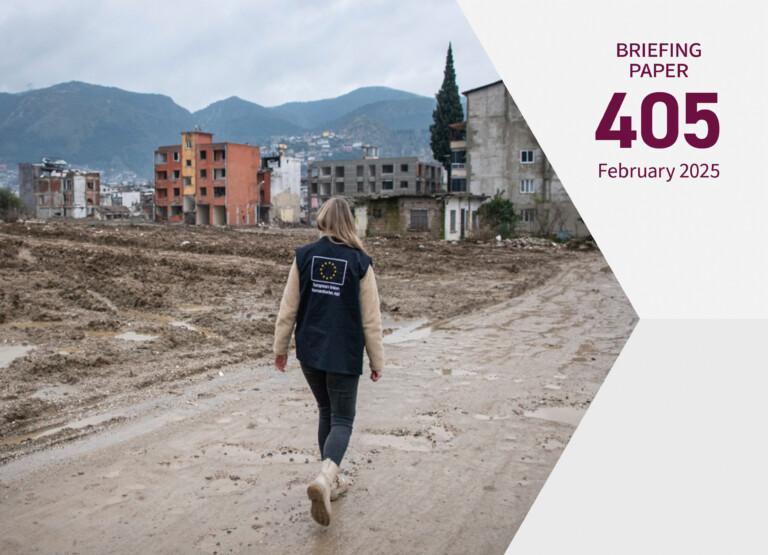
- Voters’ trust in the American elections has eroded. Even before the Covid-19 pandemic hit the United States, an alarming number of voters lacked confidence in the fairness of the upcoming elections.
- Ensuring that Americans can vote safely despite the pandemic requires major changes to how the elections are conducted. This increases the risk of mistakes and failures, partisan feuds over the rules, and accusations of foul play.
- If disputes over the practicalities of voting are prolonged, it could cause large-scale voter confusion and lead to a low turnout and high ballot rejection rates.
- Many voters are likely to vote by mail to protect themselves from the virus. However, few states are adequately prepared to receive a large percentage of their ballots by mail. To make matters worse, the United States Postal Service is on the brink of collapse.
- The result of the elections may be unclear for days or even weeks, firstly due to delays in counting the absentee ballots and thereafter because of litigation. This may result in both presidential candidates declaring themselves the winner and bring about an unprecedented constitutional crisis.
Introduction
The Covid-19 pandemic hit the United States at a time when the legitimacy of the upcoming elections was already in jeopardy, and the country will be ill-prepared to conduct elections on November 3 if the virus is still ravaging the country.
Several polls conducted before the pandemic show American voters lacking trust in their electoral system. For example, an Ipsos/C-SPAN poll in the fall of 2019 found that 46% of Americans had little or no confidence that the 2020 election would be open and fair. Moreover, 44% felt that elections in the US are rigged in favor of the rich and powerful and only 31% expressed confidence in the government having done enough to protect elections from foreign interference. Less than half, 48%, felt that elections in the United States are usually fair. Democrats expressed much less confidence in American elections than Republicans.[1] The finding is consistent with the so-called winner effect theory, which states that voters who voted for the winning candidate are more likely to say they trust the elections to have been conducted fairly[2].
Lack of confidence in American elections is not a new phenomenon. In the annual Gallup World Poll, a majority of Americans have expressed doubt about the honesty of their elections every year since 2012.[3]
This Briefing Paper outlines the reasons for distrust in American elections, explores the unique risks the Covid-19 pandemic poses to the elections in 2020, and shows that the combination of the existing vulnerabilities in the electoral system, the new threats stemming from the pandemic, and President Donald Trump’s unusual attitude towards the election process could create an unprecedented constitutional crisis.
Many valid reasons for distrust
Americans have many reasons to distrust their electoral system. For one, the constitution makes state and local officials primarily responsible for administering elections, and the lack of federal standards and oversight leaves plenty of room for human error and incompetence. According to experts, most American election officials are competent but there are pockets of incompetence that can undermine trust in the system[4]. Many became aware of this in 2000 when the presidential contest came down to a very tight race in Florida. In the process of trying to determine the winner, several problems were discovered in how Florida counties ran their elections. The elections were ultimately decided by the Supreme Court, which put an end to vote recounts, making George W. Bush the winner.
Another vulnerability in the American electoral system is the lack of independent, non-partisan election officials. The problems associated with this were evident, for example, in the Georgia gubernatorial race of 2018 when Georgia’s Secretary of State and chief elections officer Brian Kemp was also the Republican nominee for governor. The race received nationwide attention, in part because Kemp was running against Stacey Abrams, a nationally known rising star of the Democratic Party. There were several problems with the voter registration database that Kemp was in charge of, making it harder for some voters to exercise their right to vote and leaving every voter’s personal information vulnerable to data security breaches. The fiasco culminated in Kemp using the official election information website of his state to make unwarranted accusations against his political opponents, apparently in an effort to cover up his own failure to keep the voters’ personal information safe. Kemp ended up winning a very tight race, and the electorate will never know whether the voter registration issues affected the results – nor whether Kemp was just plain incompetent or acting out of self-interest.
A third concern is the extremely steep partisan polarization that is getting in the way of improving the quality of American elections. The Republican and Democratic parties don’t see eye to eye on the types of reforms needed. In general, Republicans are in favor of stricter rules and regulations to address fears of fraud, while Democrats favor more lenient rules and regulations to address fears of voter suppression. It seems likely that both parties have a – barely – hidden agenda. A higher turnout is generally believed to favor the Democrats; for example in 2016 the majority of eligible voters who chose not to cast their ballot were Democrats or Democratic-leaning independents[5]. Voter suppression, on the other hand, can be targeted for example at African Americans, who favor the Democratic Party, making it a convenient tool for the Republicans. President Trump himself has made at least one public comment linking higher voter turnout to Republicans losing elections.
The 2016 election was exceptionally problematic in terms of eroding voter confidence in American elections. Then candidate Donald Trump became known for his incendiary rhetoric, repeatedly claiming that the election was going to be rigged or stolen and refusing to promise to accept the results if he lost. After the election, Trump repeated unfounded claims of large-scale voter fraud as an explanation for his popular vote loss. Since then, members of both political parties have resorted to using incendiary words such as ‘stolen’ when elections have not gone their way, feeding into a growing cycle of mistrust and delegitimization of the election process.[6]
In 2016, Americans’ faith in their system was also shaken by Russian attempts at election interference. Unfortunately, this external threat did not unite Americans – on the contrary. President Trump has refused to fully accept the conclusions of the American intelligence community and continues to question whether the Russians were behind the observed interference. The investigation by special counsel Robert Mueller into whether the Trump campaign colluded with the Russians sealed the Americans’ hyper-partisan attitudes towards the question of alleged Russian interference, making it practically impossible to reach a bipartisan consensus to protect future elections from renewed attacks.
The impeachment of President Trump in 2019 did little to restore Americans’ faith in their system. Many Republican voters viewed Trump’s impeachment by the Democratic-controlled House of Representatives as an unfair attempt by the Democratic Party to unseat the legitimate winner of the 2016 elections for their own political benefit, which left these voters feeling that their political opponents have no respect for the democratic process. Many Democratic voters on the other hand feel that the Republican Party placed the president above the law for their own political benefit and fear the acquittal by the Republican-controlled Senate left President Trump emboldened to interfere in the 2020 election.
For all of the reasons noted above, it is not surprising that American voters expressed little confidence in the 2020 elections even before the pandemic.
In-person voting amidst the pandemic – risk of low or uneven turnout
It seems probable that Covid-19 will continue to pose a significant threat to Americans this fall, rendering it highly unlikely that all eligible voters could safely go to the polls in November. About two-thirds of Americans say they wouldn’t feel comfortable going to a polling place to vote amidst the coronavirus outbreak[7]. If no changes are made to how the elections are conducted to ensure voter safety, there is a real risk of an extremely low voter turnout, which in itself can undermine the legitimacy of the elections.
To complicate matters even further, the risk of catching Covid-19 at a polling place in November is likely to be significantly higher in some parts of the country than others, which may result in an unevenly distributed turnout that favors one party over the other. At the time of writing, Covid-19 was affecting potential Democratic voters more than potential Republican voters both geographically and demographically, as the worst pandemic hotspots were in big cities and African Americans, Hispanic and Latino Americans were more likely to catch the disease than white Americans. However, this dynamic may still change before November if the people who got sick in the first wave of the pandemic develop immunity to the virus.
One alarming scenario related to in-person voting amidst the pandemic is that some politicians may try to take advantage of the genuine health risk to suppress voter turnout in strategically chosen polling places in the hope of changing the election outcome. As a higher turnout is expected to favor the Democrats, it is the Republicans who might be tempted to resort to this. If the worst pandemic hotspots on Election Day happen to be in Democratic strongholds, the White House or state or local authorities could issue stay-at-home orders or close down polling stations, citing health risks. They could also use emergency powers to order the police or National Guard forces to guard the polling stations, which could intimidate minority voters and prevent them from voting. The White House could also establish strict standards for health protections at polling places with the hidden agenda of suppressing voter turnout in Democratic-voting big cities.[8]
It may also simply prove impossible to offer voters enough polling stations due to lack of election volunteers, as it is often elderly Americans who volunteer for this task, and Covid-19 poses the biggest risk to this age group.
Postponing the election improbable
Despite the problems Covid-19 poses to the elections, it is highly unlikely they will be postponed. Postponing a presidential election would require an act of Congress, and it is improbable that both the Democratic-controlled House of Representatives and the Republican-controlled Senate would sign off on postponement.
Perhaps more importantly, the United States Constitution mandates that a president’s term in office can only last four years. Postponing the election would not change the fact that President Trump’s first term will come to an end at noon on January 20, 2021.
To complicate matters further, the president is not the only politician whose term will expire on or before that day. Unless the elections are held, there will be no Vice President, the House of Representatives will be empty, and the Senate will only have two-thirds of its Senators. This is hardly a situation that either party desires.[9]
Vote-by-mail can easily fail
In order for the 2020 elections to be conducted safely and successfully, changes are needed. Expanding the opportunities for Americans to cast an absentee ballot by mail seems to be the most realistic way to protect voters from the virus, as some form of vote-by-mail is already in use in all 50 states. This solution is also favored by the American people: According to a Pew Research Center poll conducted in April 2020, 70% of Americans favor allowing any voter to vote by mail this year if they wish.
However, due to the decentralized nature of the electoral system, it seems unlikely that all voters will have an equal opportunity to vote by mail. Before the pandemic, five states were planning on mailing each voter an absentee ballot this year to make it easy for them to vote by mail. Twenty-eight states were going to allow anyone to request an absentee ballot. But 17 states were going to require a reason for absentee voting, and it remains to be seen if those states will consider fear of Covid-19 a valid reason to vote by mail.
Even if all states decide to allow anyone to vote by mail this year, some are more prepared than others to conduct elections this way. Half of the states are used to less than 10% of the votes arriving in the mail. For states unaccustomed to large numbers of absentee ballots, preparing for a successful vote-by-mail election is a big undertaking, and some states and counties have better financial resources or more competent election officials than others. It is easy to picture a scenario where some districts simply fail to print enough absentee ballots or have insufficient resources to mail an absentee ballot to everyone who requests one. For the extension of vote-by-mail to be successful, states are going to need considerable financial support to be able to handle the increase in workload.
The existing vote-by-mail mechanisms are far from perfect. Absentee ballots are rejected more often than in-person ballots, for example on the grounds that the voter’s signature doesn’t match the signature that the election officials have on file. Matching the signatures is not an exact science, and young people and minorities are more likely to have their absentee ballot rejected than older people and white voters. Some states show the age and partisan affiliation of the voter on the screen when the election officials are determining whether to accept a ballot. All of this has the potential to cause disputes and litigation.[10]
Voting by mail is also more susceptible to fraud than in-person voting, as the ballots travel beyond the watchful eyes of the election officials and observers and can more easily be bought, sold, altered or destroyed.
Like most things in American politics these days, the question of how to protect the integrity of the elections amidst the pandemic has become partisan. President Trump has been a vocal critic of absentee voting, making unsubstantiated claims that voting by mail substantially increases the risk of voter fraud. The Democrats have suggested mandating all states to guarantee all voters the right to vote by mail because of the pandemic, but the Republicans oppose such federal involvement. Partisan tensions have also been seen at state and local levels, and there will likey be many bitter disputes over the rules and practicalities of how the 2020 elections will be conducted in different states and counties across the nation. Even the smallest details can be fought over in the self-interested hope of benefitting one’s own party, such as whether the absentee voter needs to pay for the postage of their ballot or whether they need a witness to sign their ballot – a demand at odds with the need for social distancing. If these disagreements are not resolved soon and clear rules established well before Election Day, there is a risk of massive voter confusion, which in turn can lead to a low turnout and high ballot rejection rates.
On top of everything else, voting by mail relies on the US Postal Service, which is on the brink of collapse. The agency has been suffering financially for a long time, and the pandemic may prove to be the final nail in its coffin. The USPS has pleaded with Congress to give it financial aid, but President Trump opposes helping out the agency unless it raises its rates. The USPS says that without a government lifeline, it’ll run out of money as soon as late September. That alone has the power to disrupt any plans to conduct the November elections largely by mail.
In the case of massive failures vis-à-vis voting in a county, city or state, the state legislature could technically ignore the election results and exercise its constitutional power to choose whom their electors support for president in the Electoral College. However, no state has chosen their electors this way since the 19th century.[11]
Other factors can affect turnout
In addition to potential problems associated with in-person voting and vote-by-mail, the pandemic can decrease voter turnout in other ways. One notable factor is the amount of media coverage the 2020 elections have been receiving this spring. Were it not for the pandemic, the elections would be dominating the news, but now all things Covid-19 take precedence. It seems safe to assume that Americans are also talking about the elections less, as their minds are filled with the personal day-to-day struggles stemming from the virus and its impact on the economy.
Social distancing has meant fundamental changes to political campaigns. Shaking hands and kissing babies is out of the question. Rallies and fundraisers have been on hold, as have canvassing and face-to-face voter registration efforts. Many policy questions may seem irrelevant to voters in the face of the crisis. To some, the act of voting in itself may seem irrelevant when confronted by the sickness and death of loved ones. Many people vote out of habit, but now the pandemic has forced us to change our habits. The more complicated the new voting rules and procedures, the more likely some voters are to decide voting in 2020 just isn’t worth the trouble.
For anyone seeking to undermine the elections by spreading disinformation in social media, be they an American citizen or a foreign agent, the pandemic offers ample opportunities. The more chaotic things get in real life, the more likely voters will believe you if you claim the Election Day or their polling location has changed, or send out incorrect instructions on how to vote by mail. Disinformation can also be used to amplify fears of catching the virus when voting.
The pandemic may also have more indirect effects. In late May and early June 2020, it contributed to the rise of racial tensions, protests and rioting across the country. At the time of writing, it was too early to tell how the unrest might affect voter turnout in November.
A contested result likely
For all of the reasons listed above, there is a high risk of the election being seen as illegitimate or the results being challenged in court. The losing side will be tempted to challenge the results, especially if voting has somehow failed in swing states or in areas where the losing side usually wins by large margins. Litigation may also ensue if there is reason to question the integrity of the election process.
In 2000 Al Gore conceded after the Supreme Court ruled in favor of his opponent. Not all voters were happy with his decision, but on the whole the American people accepted the outcome and moved on. Much has changed since then, and it is no longer a given that preserving the sanctity of the transition of power is the utmost priority for voters – or even both presidential candidates.
In 2016, then candidate Trump refused to promise to accept the outcome if he were to lose. Today there is no less concern that he might contest the results. His repeated claims of vote-by-mail being susceptible to fraud seem to be paving the way for him to claim the election has been stolen from him, and he has plenty of loyal supporters willing to believe his claim. On the Democratic side, the number, size and vigor of protests against the new administration in 2017 was unlike anything seen before in the United States, and now the stakes are perceived to be higher than ever before. Both sides feel they are fighting for the future of America, and they’re likely to continue the battle to the last breath. For all of the reasons explained above, it is probable that the losing side will find at least some reasonable reason to challenge the results in court, and most likely even a Supreme Court decision won’t be enough for all of the voters to accept the outcome.
Even if there is no litigation, a smooth transition of power is not guaranteed. In the American electoral system, absentee ballots usually take longer to count than those cast in person. It is also typical that the big city votes take the longest to count – and that cities tend to vote Democrat. In a likely scenario, the winner may not be called on election night. If the partial returns point to Trump, the fear is that he will declare himself the winner and mount a massive campaign to discredit the absentee ballots yet to be counted. If those votes tilt the scale in favor of Trump’s opponent, both candidates will claim victory, and in this hyper-partisan era, both just might have the backing of their party. Even lacking that, they would be guaranteed to have the backing of their loyal supporters.[12]
The recent protests and riots across the United States show that there is a lot of pent-up anger in a country ravaged by the deadly virus. They also prove that fear of the virus is not enough to keep people off the streets. If the elections yield a contested result, the risk of violent protests and riots is high.
Conclusion
Much talk of the American elections and Covid-19 has centered on the question of who is most likely to reap political benefit from the pandemic. However, there is a real risk of no-one benefitting. Instead, there may be an unclear election outcome followed by litigation and massive protests. In that all too likely nightmare scenario, whoever becomes president has a questionable mandate and is unlikely to be accepted as the leader of the divided nation. This could have happened without Covid-19, but the pandemic makes it much more likely.
If the transition of power fails to go smoothly, the implications are severe – not only domestically but also internationally. Since Trump took office, the role of the United States in the world has already been changing and its prestige on the world stage eroding. The Covid-19 pandemic is threatening to cause an unprecedented constitutional crisis, which can in turn diminish the international standing of the country even further.
Endnotes
[1] IPSOS: Americans are Split on Election Fairness, Confidence in Voters to Make the Right Choice. Democrats and Independents are Less Likely to Trust Elections than Republicans. Press release October 2019. https://www.ipsos.com/sites/default/files/ct/news/documents/2019-10/cspan-election-policy-topline-v2.pdf.
[2] Betsy Sinclair, Steven S. Smith and Patrick D. Tucker: “It’s Largely a Rigged System”: Voter Confidence and the Winner Effect in 2016. Political Research Quarterly 2018, Vol. 71(4) 854–868.
[3] R.J. Reinhart: Faith in Elections in Relatively Short Supply in U.S. February 13, 2020. https://news.gallup.com/poll/285608/faith-elections-relatively-short-supply.aspx.
[4] Ad Hoc Committee for 2020 Election Fairness and Legitimacy: Fair Elections during a Crisis: Urgent Recommendations in Law, Media, Politics, and Tech to Advance the Legitimacy of, and the Public’s Confidence in, the November 2020 U.S. Elections. April 2020.
[5] Pew Research Center: For Most Trump Voters, ‘Very Warm’ Feelings for Him Endured. Also: A detailed look at the 2016 electorate, based on voter records. August 9th 2018. https://www.people-press.org/2018/08/09/for-most-trump-voters-very-warm-feelings-for-him-endured/.
[6] Richard L. Hasen: Election Meltdown. Dirty Tricks, Distrust, and the Threat to American Democracy. Yale University Press 2020. And Pippa Norris: Why American Elections Are Flawed (And How to Fix Them). Cornell University Press 2017.
[7] Pew Research Center: Most Americans Say Coronavirus Outbreak Has Impacted Their Lives. More than half have prayed for an end to the virus’s spread. March 30, 2020. https://www.pewsocialtrends.org/2020/03/30/most-americans-say-coronavirus-outbreak-has-impacted-their-lives/.
[8] Anthony Zurcher: Coronavirus: Could Donald Trump delay the presidential election? Apr 17 2020. https://www.bbc.com/news/world-us-canada-52326166
[9] Ibid.
[10] Pew Research Center: Two-Thirds of Americans Expect Presidential Election Will Be Disrupted by COVID-19.
Sizable majority favors option of voting by mail. April 28, 2020. https://www.people-press.org/2020/04/28/two-thirds-of-americans-expect-presidential-election-will-be-disrupted-by-covid-19/ And Ronald Brownstein: The Most Important 2020 States Already Have Vote by Mail. But the battle over expanding access is only getting started. The Atlantic April 11, 2020. https://www.theatlantic.com/politics/archive/2020/04/voting-mail-2020-race-between-biden-and-trump/609799/.
[11] Zack Stanton: ‘The Nightmare Scenario’: How Coronavirus Could Make the 2020 Vote a Disaster. Trump can’t cancel the presidential election. Here’s what you should really be worrying about. Politico Magazine April 28, 2020. https://www.politico.com/news/magazine/2020/04/28/2020-election-coronavirus-disaster-impact-215559 And Devin McCarthy: How the Electoral College Became Winner-Take-All. August 21, 2012. https://www.fairvote.org/how-the-electoral-college-became-winner-take-all.
[12] Zack Stanton: ‘The Nightmare Scenario’: How Coronavirus Could Make the 2020 Vote a Disaster. Trump can’t cancel the presidential election. Here’s what you should really be worrying about. Politico Magazine April 28th 2020. https://www.politico.com/news/magazine/2020/04/28/2020-election-coronavirus-disaster-impact-215559









